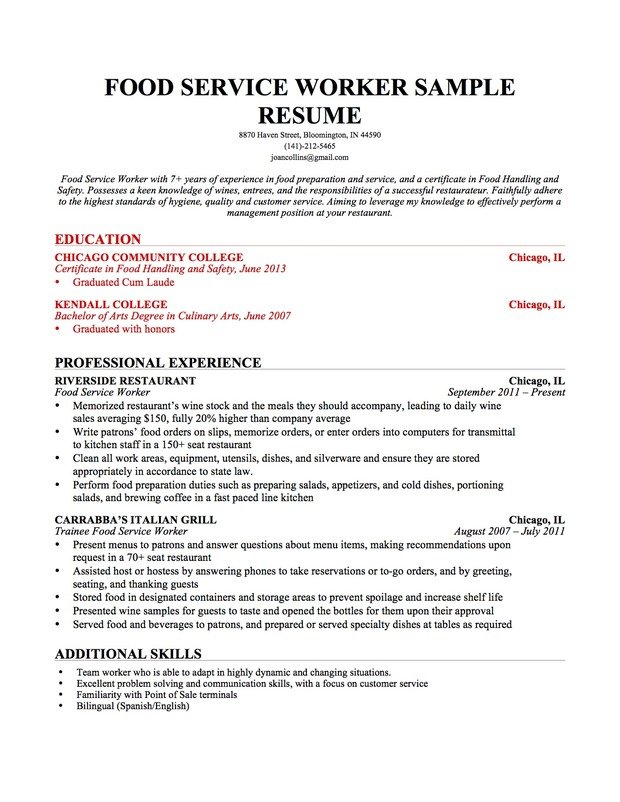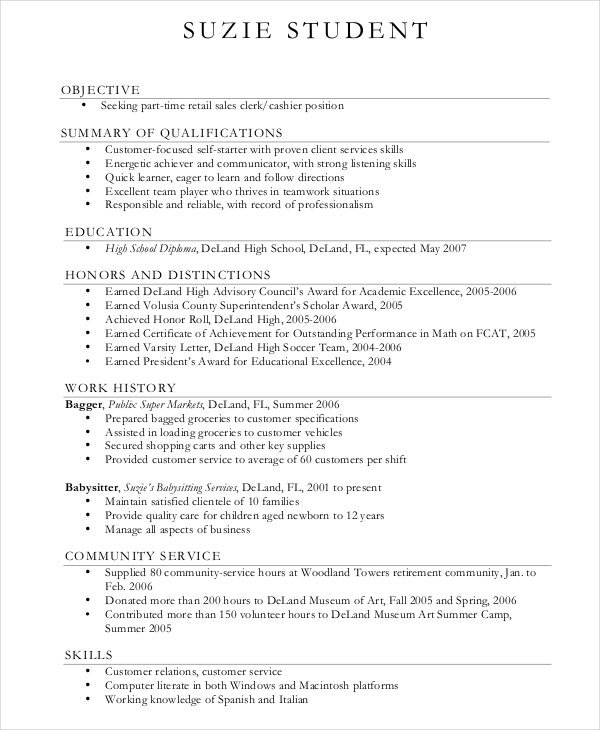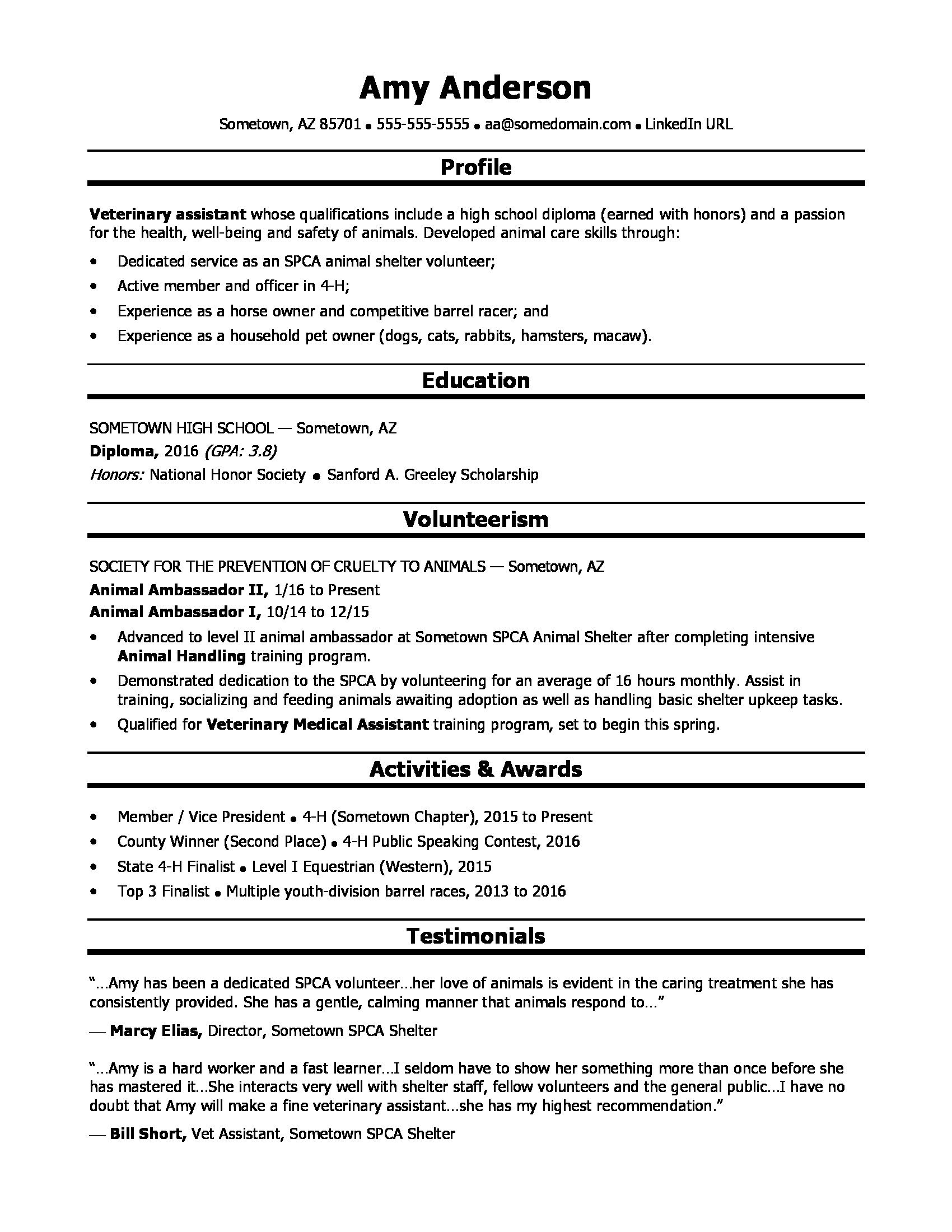Irrelevant Education On A Resume
As stated above, your resume should be tailored to the job you’re applying to. If you have education–especially if it’s in addition to similar education–that isn’t related to your current career target, you can leave it off your resume.
Including irrelevant information on your professional resume will do more harm than good. The only purpose of a resume is to show relevant coursework and that you’re qualified for the position you’re applying to. There are even situations where irrelevant jobs should be removed from your resume.
Example of irrelevant education:
If you have a certification from a web development program, but you’re targeting an accounting position, you can safely leave off your additional certification. While web development skills are some of the best types of skills to include on a resume, you can leave them off your resume when it comes to tailoring your resume.
Should You Put Your High School Diploma On Your Resume
If you are a high school student, college student, fresh graduate with no work experience, or if your high school diploma is your highest education, you should definitely add your high school education to your resume. Once you gain any other form of higher education, you should take your high school off your resume.
Create A Section Of Your Resume Specifically For Education
Because employers look for an education section, make sure you have one on your resume. Typically, education sections appear toward the bottom of your resume after your experience, although you may include this information on either the left or right side of your resume if you’re using a unique template. Create an education header and only include information pertaining to your education in this section.
Recommended Reading: How To Add Relevant Coursework To Resume
Multiple Degrees Or Certifications On A Resume
Some people have earned multiple degrees or certifications over their careers, leading to an education section that takes up valuable page real estate. If your education section is too long or confusing, you’ll fail the 6-second resume test.
Hiring managers and employers are not going to dig through your education section to see if you have the specific degree or certification they’re looking for. If you have multiple degrees, only list the one most relevant to the position or industry you’re targeting.
What Not To Include When You’re Writing A Resume

What shouldn’t you include in your resume? Because resumes are typically only one to two pages long, your resume should contain only information related to the job for which you’re applying. There is some information that should be included in every resume. There are also some things that don’t need to be listed.
The hiring manager should be able to skim through your resume and see your qualifications without knowing everything about you. It often makes sense not to include information on your resume that could hinder your chances of getting an interview.
Here are some items that you should avoid including on your resume.
Recommended Reading: Resume Relevant Courses
Otherwise Your Work Experience Should Come Before Your Education Section
If the situations above dont apply to you, and you dont have another good reason to list your education first, stick to the standard convention as lead with your work experience. Employers primarily want to know about your work history and achievements, so unless your education is very recent, youre better of focusing on your professional accomplishments.
Career Q& a: Is It Lame To Put High School Achievements On My Resume
Q: As I start applying for internships and jobs, Im wondering how much high school experience matters to potential employers. Considering that Im a college sophomore now, how long is too long to keep listing my 10+ high school activities, honor societies and leadership positions on my resume? Does it look juvenile if I talk about high school experiences in interviews?
A: The rule of thumb for including high school activities is that you can go back four years . So, if you are a sophomore you can include the last two years of high school stuff and the first two years of college if you are a junior in college, you can include the last year of high school, etc.
However, my gut response is that Id limit high school mentions to only one or two of your most impressive or unique accomplishments . In the workforce, high school seems very young. Of course, if you have anything SUPER impressive from high schoola major award, national recognition, a Grammy, an Olympic medal, etc.keep it on your resume as long as youd like!
Also Check: Publications In Resume
Things Not To Include In Your Resume And Why
When it comes to Resumes what NOT to include is almost as important as the information thats in there. Your Resume needs to give the recruiter a great first impression but it will probably be one of many received. Its therefore important to use the space and words wisely and ditch the unnecessary clutter.
Its never been more important to get your Resume and job application 100% right the first time. Since it will most likely be one of many received, you need to give yourself the best chance at getting noticed. As Resume Writers, we often get asked why certain information hasnt been included.
Heres a list of five things we avoid and why:
1. Career Objective: Dont waste words stating what you want. Put yourself in the employers shoes. They need to understand immediately Whats in it for me? not what youre searching for in life. Instead of your own personal career objective, we suggest including a career overview that provides a snapshot of who you are, your relevant qualifications, skills and experience and the overall value you could bring to the role.
3. Personal Information: It is not necessary to include age, height, weight, marital status, health, children, hobbies, religious, cultural or political associations so dont waste space by doing so.
Where To Put The Education Section Of Your Resume
Current students, recent college graduates, or career changers may want to put the education section towards the top of their resume. This is because students typically have limited work experience and want to highlight academic success.
If you have been out of school for at least a couple of years, you can move this section to the bottom of your resume. By this time, you have enough work experience to highlight that you dont need to rely on your education.
You May Like: When Should You Put Your Gpa On A Resume
If Youre A Current Student
If youre still studying, your education section can be a lot bigger, since youre unlikely to have a lot of relevant work experience. You should include any major accomplishments, including awards and involvement in extracurricular activities, but only list your GPA if its particularly impressive . Any part-time work experience or internships can go in the work history section of your resume.
If you know when youll be graduating, go ahead and list the expected date.
Generally, you shouldnt include your high school information once youre in college, as its no longer relevant. If you do, keep it strictly to one line.
Include Internships And Student Placements
Internships paid or unpaid are generally a better fit for your work experience section, since they take place in a professional work environment. List these the same way as paid work experience, including the name of the employer, the dates of the internship, and a few key accomplishments in bullet points.
You can include student placements if they were a) significant, b) recent, and c) relevant. In other words, a six-month hospital placement belongs on your resume if you’re a recent nursing graduate, but a two-week observation probably doesn’t.
Recommended Reading: How To Write An Email To Send A Resume
Should You Put High School On Resume
If high school is your only education, thats fine!
Just add it as your sole education entry, exactly as in the previous example.
Here is an example of high school education on resume:
Heres how to list GED on your resume:
GED High School Equivalency Diploma
Bronx Adult Learning Center, Bronx, NY
Or a Test Assessing Secondary Completion :
TASC High School Equivalency Diploma
Brooklyn College Adult Literacy Program, Brooklyn, NY
Finally, heres the California High School Proficiency Examination :
CSBE Certificate of Proficiency
Clayton Valley High School, Concord, CA
Expert Hint: We dont recommend dates on finished degrees and diplomas, especially if theyre more than 10 years in the past, but they are useful when the program remains unfinished.
Should I Remove High School From Resume

Few people did not do anything until the end of college and the first job application. You may not have experience in a company, but you have probably been a student organization member, volunteered, or organized an event.
Why not state it if it can be in your favor? Presuming this applies to you or want to learn how to put student teaching on resume, make sure to read our dedicated article.
If you are applying for a position where, for example, good communication skills are required, indicate if you have taught English or have been a waiter. Although these are not relevant experiences in terms of expertise and knowledge for the position, they show that you have the skills you need to do who are applying.
So, the question is, when should you take high school off your resume? Entering data on education and degree is not required. Accordingly, the high school you graduated from is not relevant unless it is the highest level of your education. Indicate the year of your graduation, the degree, and the name of the higher education institution where you graduated.
On the other hand, you do not have to write in more detail about your academic achievements unless you have just graduated and have no experience.
Read Also: How To Put Problem Solving On A Resume
College Student: Some Work Experience
If you are a college student with work experience, then your resume should follow a slightly different format. Look over our entry-level accounting resume example below to get an idea of how to structure yours.
What This Recent Graduate Did
In this example, we see the applicant has internship experience, so their Education section only mentions items of importance like relevant coursework and GPA they also placed it underneath their Career Objective. If you have work or internship experience, you should follow this format.
North Dakota University, Fargo, NDBachelor of Science in Accounting and Finance, May 2016
- Minored in Business Administration
- Distinguished member of universitys Accounting Society
- Relevant Coursework: Advanced Financial Accounting and Reporting, Accounting Systems, Income Tax for Corporations, Cost/Managerial Accounting
- GPA: 3.75/ 4.0
Eventually, after you have accrued solid work experience, you can place your Education section at the bottom of your resume body until then, supplement your hands-on experience with academic muscle.
What You Should Do
Your Resume: What To Put In What To Leave Out
Wondering how to organize the information on your resume? This resource overviews the sections to include on your resume, and what information to include in each of them.
All resumes will include the following:
Everything on your resume should be accurate: an honest reflection of your skills, experience, and academic accomplishments. Do not exaggerate or embellish this information.
Read Also: Leadership Skills On Resume
Examples Of Education On Your Resume
Example #1: Standard
National Institute for Non-Profit Development San Diego, CACertificate in Grant Writing and Proposal TrackingMarch 2017
How do you list an incomplete PhD on a resume? How do you list an incomplete MBA on a resume? Some people might feel a certain level of shame at not completing a PhD or MBA, but there are often deeper reasons that are well worth exploring in an interview. Failure is a part of life and there is no shame in aiming high and falling short. If you are not exploring your past shortcomings in your interview, you are not fully exploring who you are. Be human, be humble and list it down .
If You Transferred Schools
If you started and finished your degree at different institutions including transferring between four-year schools or from a community college it’s fine to just list the name of the school you graduated from. If you’re a recent graduate and have achievements on your resume from your previous institution , you can consider listing both schools for clarification.
You May Like: What Does Relevant Coursework Mean
Dont Be Put Off By A Bachelors Degree Requirement Even If You Dont Have One
Heres a lesson about hiring: If you dont meet all of the qualifications, you can still apply. Not enough workers know this: In a survey of thousands of U.S. professionals, 46 percent of men and 40 percent of women listed I didnt think they would hire me because I didnt meet the qualifications as the reason they did not apply for a job. But required qualifications are not always required.
Even if a bachelors degree is required, I would still go ahead and apply. In my experience, weve made exceptions before, Watkins said.
Candidates may also discount themselves for lacking a recommended certificate or certain degree, but that does not necessarily mean they are unqualified.
I would let the employer tell me no instead of me making the assumption, Watkins said. If you have 80 percent of what the employer is asking for, youre more than likely safe to apply, because that other 20 percent is a learning curve. You dont want to apply for positions where you meet 100 percent of the qualifications, because you run the risk of being overqualified. You have no room for growth there.
Listing Education With Limited Work Experience
In resumes that have limited or no work experience, as may be the case with college students or recent graduates, the education section may be a good opportunity to show off educational achievements instead.
Additional information that can be included in longer education sections can include:
- Internships completed as part of a curriculum
- Academic assistantships with professors or other academic professionals
As covered, in documents such as CVs the education section could be fairly lengthy.
However, the education section for most resumes will be one of the shortest sections.
This is mostly because standard resumes will be used for entry-level or mid-level positions, while longer-form resumes like the CV will only come into play for more prestigious or hard to obtain positions.
It is much more important to show either a robust work history or detail relevant and transferable skills, using your education as support rather than the main point of interest.
Here are some quick tips for deciding what educational information to include in a resume:
1) When including professional hobbies and extra curricular activities, it is important to keep relevance in mind
Incorrect: Do not include information about sports clubs or other clubs that cannot be connected back to your qualifications for a job.
Keep your descriptions simple and concise
Correct: Use bullet points to separate bits of information to keep your resume easy to read or skim.
Read Also: How To Add Resume On Indeed
Should You Include A Gpa
New graduates often list their final GPA on a resume, believing that its a requirement for the job. Additionally, mentioning a high GPA can give you a sense of pride. Deciding to include your GPA on a resume is understandable.
Listing your GPA or the fact that you received Deans List or cum laude honors wont hurt your chances of getting an interview. However, it wont typically give you an edge over your competition, especially if your competition has more relevant work experience. In truth, employers arent as swayed by high or low GPAs as many applicants believe.
If you do decide to include your GPA, heres a way to format it:
West Seneca State College | West Seneca, NY | May 2016Bachelor of Science, Accounting | 3.45 GPA
Kicks Two Cents: How To Make Your Education Section Stand Out

Also Check: Listing Languages On Resume
How To List Education In Progress On Your Resume
ZipJob Team
6 min read
Are you unsure about how to list your in-progress education on your resume? Many people are, including current students, students taking online classes, and people taking a break from their degree programs.
Is it acceptable to include unfinished degrees on a resume?
ZipJobâs career experts agree that education in progress should usually be included on a resume. A degree in progress is still important to employers, as well as a degree that was started and holds relevance to a position. However, it needs to be included in an honest way so itâs an accurate reflection of your learning and accomplishments.
If youâre currently pursuing a degree, here is how you can include it on your resume .